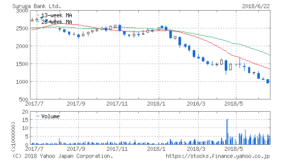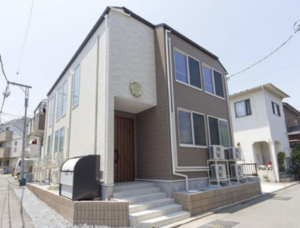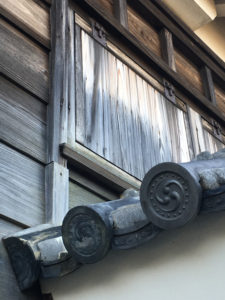In today’s uncertain economy, dynamic growth potential with low risk is tempting.
Real estate companies are constantly manufacturing the opportunities to captivate the naive investors.
Kabocha no Basha was one of them.
Suruga Bank Scandal background
Japan’s Financial Services Agency has launched an emergency inspection into Suruga Bank over investment irregularities involving women-only shared houses.
Suruga Bank extended over 100 billion yen ($915 million) in loans to about 700 people, mainly middle-aged salaried workers, to invest in Kabocha no Basha — or “Pumpkin Carriage” ; women-only shared houses operated by Smart Days.
Tokyo-based Smart Days also worked as a middle man between Suruga and investors and solicited investment from salaried workers, pledging to pay them rents for 30 years.
But Smart Days struggled with low occupancy rates and stopped paying the rents to owners they promised in January 2018.
Smart Days filed for bankruptcy in April 2018.
Some employees in Suruga bank are alleged to have been involved in wrongdoing, including doctoring documents such as certificates of annual income and bank balances to smooth internal screening of loan applications.
Suruga Bank already admitted to falsifying documents and other improprieties in a shared house system that promised high investment returns through rents.
The FSA began an on-site inspection into the lender in mid-April but can target only the bank and current employees.
The FSA has concluded some bank executives likely took part in the fraudulent deeds.
Moreover, the latest disclosures to hit Suruga Bank concern loans to buy second-hand residential buildings which has attracted a number of salaried workers for a decade.
The properties, mostly in regional areas, carried price tags between 100 million yen and 200 million yen.
The bank is said to have provided loans to investors despite being aware that rent-rolls (information on rents a property is producing) on the properties in question had often been falsified.
Real estate agents apparently worked with bank employees to disguise low occupancy rates of rental units by pretending they were higher.
More occupants generally means that a property is generating more rent income, which often enables a borrower take out a bigger loan.
An official with the bank acknowledged that the bank was aware that some rent-rolls were falsified.
Shares of the bank as of June 2018 have dropped 60 % from 2500 yen to 1000 yen since June 2017.
(Suruga Bank share from July 2017 to June 2018)
What is the mechanism of the shared house system ?
The mechanism of the shared house investment is very simple.The operator, Smart Days, finds the land and constructs
the shared house for rent, whose land and construction costs were covered by the loans by Suruga Bank, and
Smart Days sublet units on behalf of the investors who owned the properties.
Smart Days pledges a guarantee of the rent payment for 30 years after taking their profit margin to operate.
It is called ‘subleasing’ system.
It is said mid-career salaried workers with an annual income of 8 million yen to 10 million yen jumped
in the bandwagon.
Apparently Smart Days tied up with Suruga Bank for the system so that the investors could secure the loan without
serious hassles.
Net yield Smart Days guaranteed for the investors is 8%
on the initial investment with the promise of 30 years
rent payment.Investors believe it will be easy to repay the loan as long as Smart Days guarantees the rent payment by subleasing.
My guess is they took a risk of somewhat huge amount of debt because they believed they could enjoy the tax breaks by deducting the expenses from the real estate investment from the salaried income.
Rogue real estate agents here always throw a sales pitch and blow the tax benefit out of the proportion.
However, this system went south very easily.

Why it went south ?
Anyone can tell with some real estate investment experience as common knowledge that there is no property that generates yield 8% in the current real estate circumstances.
“Kabocha no Basha ” is a shared house for women.
The renting out of shared houses is usually challenging
as it is not the conventional rental room.
The location of the property is even more important than the conventional properties.
You need more skills to attract the tenants through internet marketing.
It is a business that raises profits by targeting multiple young tenants with relatively low income.
Credit control is more difficult. In order to realize this “impossible” yield, Smart Days ordered a newly-built shared house at a higher price than the estimated building cost, got a large back margin from the builder, and used part of back margin for guaranteed rent.
For investors, apart from the rent received from the female tenant, they also use the fee to be received by arranging the employment of the women who moved into Tokyo from the local regions.
The business model is not practical.The businesses is like Ponzi scheme. While the new sales are going well, it is sustainable.
However the company’s system is very unbalanced, and a crisis could easily occur if things get off track.At present, Suruga Bank is under fire because they
extended the loan to the investors by falsifying the documents.
These fraudulent stories exist everywhere.
I personally know a manager of a major foreign company who invested 100 million yen un the shared house system.
He is a manager of a big corporation so he has an annual income of 10 million yen. He purchased 100 million yen of property (shared house) on a loan for the full amount, 8% yield with a guarantee of 30 years.
But the rent payment from the operator stopped just 3 months after the start of operation.
He even did not see the property until he got into the trouble and then found out that only 6 rooms out of 11 were rented out.
So who should be blamed ?
The main stream media such as Nikkei and Asahi
have been harshly criticizing Smart Days and Suruga Bank for their wrongdoings featuring the deceived investors by the villain.
Are they the only ones to blame ?
First of all, the business owner is the investor, the owner of this share house is the investor.Under the subleasing contract, Smart Days is the
tenant and the position of the tenant is well protected by the lease tenancy law in Japan.In other words, technically speaking, although “rent is guaranteed” by Smart Days, it would be feasible for tenants to ask the landlords lowering rent. Also, if the rent can not be paid in the end, depending on the terms of the lease contract, the tenant can withdraw within the lease term if paying a certain penalty.
I am sure Smart Days was aware of the loophole of the
laws and trying to exploit it when they are negotiating
with the owners to lower the rent payment they promised.
(Kabocha no Basha shared house in Meguro)
What about investors ?
They ARE not elderly people without the finance literacy or people without judgment capacity.
Many of the victims are salaried workers with relatively high income who should have been more fraud-alert and protect them from the scam.
They should have done some basic due diligence before they made a decision of the life time.
Have they checked the concept of the subleasing system and the viability of the rent guarantee for 30 years.
Did they study if the company has the financial strength to sustain the guarantee for 30 years?
What kind of problems and disputes had happened in the subleasing business in the past ?
Have they searched if the price of land was fair based on the standard land prices for prices of apartments and condominiums ?
(the standard land price of certain area can be found by internet quite easily in Japan)
Based on the standard cost of construction of the buildings, the construction cost of those shared houses offered by Smart Days was fair ?
On the contrary, I can imagine those made investment were just dreaming about the idea of increasing the income without any difficulties,
without the proper due diligence. In the case of the Suruga Bank’s financing case, an excessive price was formed as a result of the loan being attached to the share house without sufficient tenants.
But in the background of the case, the owner of the share house apparently mis-judged the risk of subleasing and the promise of Smart Days.
This type of problem may not be necessarily unique to Suruga Bank.
In fact, the total loan balance for the rental house of the Japanese banks has offered exceeds the peak of the bubble period.
With the declining population and growing number of vacant houses, it is necessary to think twice to make a decision in real estate in Japan.
The regional banks are trying to expand the risky business because the business model of the domestic banking business are becoming
obsolete and the historically low long-term interest rate is making the bank’s lending margin shrinking.
We must be wary of the risk that stalled financial institutions run into bad credit expansion.
Final thoughts
Whilst it is important to crack down on illegal activities involving the scandal, I do not necessarily cast the sympathetic eye at those investors who lost the money due to the collapse of Smart Days.
When you make investment, you have to always expect certain risk but the risk must be calculated.
You have to do all necessary due diligence before making a big decision.
Don’t make investment just because one of your good friends recently made appearing to be a good deal.
(I got burned and learned this lesson 20 years ago !)
Meanwhile, in real estate, money is made when you buy not sell.
The real estate is typically a very long-term investment.
You must be well informed and have professional assistance in form of real estate professionals
when you buy the real estate.
You can only find a bargain property when the seller might be facing special circumstances that might make him or her more motivated to sell at a below market value.
There is no such thing as a free lunch.
Lastly, I am a little concerned that borrowers are stretching more, especially the home buyers in Japan.
One reason more borrowers may be stretching: Real estate prices are rising sharply in big cities especially in center of Tokyo.
Some nonbanks are extending the loan to ones who should not really be accepted.
I am not saying the current timing is not good but be aware real estate agents earn the fee on the commission basis
and they always have hidden incentive to inflate the size of a deal or your loan amount.
If you are just a couple, you would need only a couple of bed rooms not five even if you can afford it.
Source: Asahi shimbun
Nikkei
Other Helpful Articles About Kabocha no Basha and Suruga Bank
Toshihiko Yamamoto
Real estate investing consultant and author.
Founder of Yamamoto Property Advisory in Tokyo.
International property Investment consultant and licensed
real estate broker (Japan).
He serves the foreign companies and individuals to buy and sell
the real estates in Japan as well as own homes.
He holds a Bachelor’s degree in Economics from
Osaka Prefecture University in Japan
and an MBA from Bond University in Australia
Toshihiko’s book, “The Savvy Foreign Investor’s Guide to Japanese Properties: How to Expertly Buy, Manage and Sell Real Estate in Japan”is now out on Amazon, iBooks (iTunes, Apple) and Google Play.
About the book
Amazon.com Link






